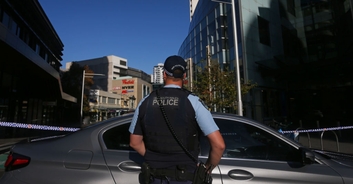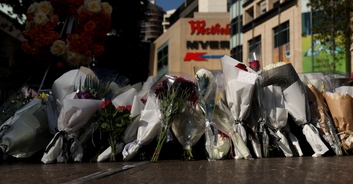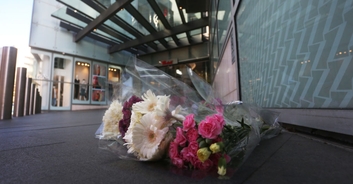With climate change activists becoming ever more militant, the evidence to suggest that humans are causing global warming is continuing to stack up. It’s now been 15 years since the science fiction film The Day After Tomorrow painted us a nightmare scenario whereby climate change brings about a new ice age.
This, of course, was entirely fictional. However, in the time since this movie was released nowhere near enough has been done to reverse the damage we have caused. Furthermore, while New York certainly won’t turn into an arctic wasteland overnight, the end of civilisation could be a lot nearer than we think.
A new paper published by the Breakthrough National Centre for Climate Restoration has claimed that climate change could cause a complete societal collapse over the next 30 years. Breakthrough - a think-tank based in Melbourne, Australia - looks at the wider implications of global warming. As the report explains, “climate-change impacts on food and water systems, declining crop yields and rising food prices driven by drought, wildfire and harvest failures have already become catalysts for social breakdown and conflict across the Middle East, the Maghreb and the Sahel, contributing to the European migration crisis.”

The paper is co-authored by David Spratt, a Research Director for Breakthrough, and Ian Dunlop, a former international oil, gas and coal industry executive and chairman of the Australian Coal Association. “Today’s 7.5 billion human beings are already the most predatory species that ever existed,” explains the foreword, written by former head of the Australian military Admiral Chris Barrie, “yet the global population has yet to peak and may reach 10 billion people, with dire implications absent a fundamental change in human behaviour”.
The paper describes a scenario whereby humankind continues as usual, causing a “near- to mid-term existential threat to human civilization”. It argues that there would be “extremely serious outcomes” of climate-related security threats however, predicting what form they will take and how to combat them will be difficult as this would “fall outside the human experience of the last thousand years.”
“Even for 2°C of warming, more than a billion people may need to be relocated and in high-end scenarios, the scale of destruction is beyond our capacity to model with a high likelihood of human civilization coming to an end,” the report states.

Last year, however, a climate change report by the UN was widely criticised for being too alarmist. However, the authors of this study believe that, so far, forecasts and estimates handed to policymakers have been far too conservative. They are therefore looking at “scenario analysis” to get a better idea of potential outcomes depending on the path we take.
This model of abrupt climate change cites “tipping points” which would accelerate certain weather processes. “By 2050, there is broad scientific acceptance that system tipping-points for the West Antarctic Ice Sheet and a sea-ice-free Arctic summer were passed well before 1.5°C of warming, for the Greenland Ice Sheet well before 2°C, and for widespread permafrost loss and large-scale Amazon drought and dieback by 2.5°C,” the paper explains. “The ‘hothouse Earth’ scenario has been realised, and Earth is headed for another degree or more of warming, especially since human greenhouse emissions are still significant.”
The hothouse Earth theory poses that once a pivotal tipping point is reached, the planet will continue to warm up at an accelerated rate due to the Earth’s natural processes. Having triggered this process, the consequences will be entirely unavoidable.

“What can be done to avoid such a probable but catastrophic future?” the conclusions posits. “It is clear from our preliminary scenario that dramatic action is required this decade if the ‘hothouse Earth’ scenario is to be avoided. To reduce this risk and protect human civilisation, a massive global mobilisation of resources is needed in the coming decade to build a zero-emissions industrial system and set in train the restoration of a safe climate. This would be akin in scale to the World War II emergency mobilisation.”
Sadly, the effects of global warming are becoming all the more visceral. Melting polar ice, rising sea levels, destruction of habitat and the extinction of various species is just some of the damage which has already been done.
While climate change is indeed a severe global issue, many experts argue that it is not the most pressing - and that deforestation is causing greater harm at a faster rate. Together with the plastic waste crisis, these issues form the bulk of the collateral damage that humankind is doing to the planet.

That said, steps are being taken. Just last month, the UK marked a historic moment when a whole week elapsed without the use of coal to generate energy for the national grid. Meanwhile, other countries, such as Iceland, are using almost entirely renewable energy. However, many people believe that, when taking a holistic view, this is simply not enough.
If you would like to make a change, you can donate to longstanding climate change activists Greenpeace or sign one of their petitions.










